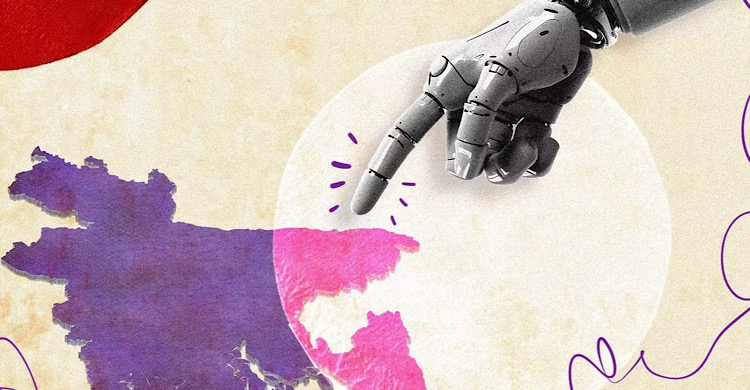AI boom hits Bangladesh amid global race in ‘Fourth Industrial Revolution’


Artificial intelligence (AI) is no longer just about ChatGPT, Gemini, Grok, or Perplexity; in an age charged with the excitement of the Fourth Industrial Revolution, billions of dollars are being poured into AI and automation as global tech giants compete fiercely, and this technological wave has now reached Bangladesh as well.
When businessman Selim Hossain called a private bank’s customer service recently, he expected to go through the usual menu options. Instead, he encountered something entirely different.
“An AI answered my call. It responded exactly as a human executive would — it felt like I was talking to a real customer service officer on a personal line,” he said, still astonished by the experience.
It is not just banking. Where once large customer service teams were required, now most tasks are handled through AI chatbots, and these have already evolved beyond text-based chat to live voice calls.
Faraz Ahmed, CEO of Global Leads Telesolution, a local teleservice company, said the industry has transformed drastically over the past five years.
“Previously, handling foreign clients required at least 15–20 team members, sometimes even 50 for large companies. Now, five people can manage an entire teleservice team — thanks to AI and automation,” he said.
He explained that AI can be trained to handle specific client interactions. Human intervention is only needed when an issue arises. “By subscribing to advanced AI software instead of maintaining large teams, we’ve redefined the entire teleservice job structure in Bangladesh,” Faraz added.
In the private job market, the familiar ‘curriculum vitae’ or ‘résumé’ is also seeing a shift.
According to a study titled ‘Application of Artificial Intelligence in Human Resource Management: A Bangladesh Perspective’ by the University Library of Munich, most Bangladeshi companies now use AI-based automation for CV and résumé screening.
AI is not only handling candidate screening but also the first stages of interviews. Various applications now replicate the functions of an entire HR team.
Mahmudul Hasan, Assistant Manager in the HR department of a software company, said most firms now rely on AI for attendance tracking, résumé screening, and even conducting preliminary interviews.
He mentioned AI-powered software like Olivia, HireVue, Leena, and Latis, which can conduct video interviews and assess candidates’ coding skills — even through complex tasks that human evaluators might find challenging.
“In a mid-sized company, an HR manager might earn around Tk 150,000 a month for tasks like talent acquisition, interviewing, attendance and performance checks. A single AI software can now handle all that for just Tk 100,000–200,000 a year,” Hasan noted.
In Bangladesh’s garment industry, the once-common position of ‘supervisor’ is disappearing fast.
“Our sewing machines now have screens displaying daily targets. If production falls below 50%, a red light flashes; above 70%, orange; and 100% completion triggers a green light,” explained one worker.
This monitoring system is now entirely AI-driven. A semi-automated application named Nidle is commonly used in the sector to track how long each worker operates a sewing machine and how much time is spent idle.
AI is also transforming video editing, content writing and voiceover work. Shamim Ahmed, CEO of View Motion360, a contract-based video content production firm, said Adobe’s AI tools have made their work much easier.
“With Adobe Firefly, we can now handle graphics, image generation, and video editing with basic skills. In a few years, Photoshop and Premiere Pro will become fully AI-driven. Then, professional-quality content can be produced without hiring designers or editors,” Shamim added.
A 2019 UNDP study on Bangladesh’s job market projected that by 2030, around 5.38 million people may lose their jobs as automation replaces traditional roles. To survive, workers will need to adapt and upskill in line with new technologies.
According to a 2023 McKinsey study, half of all jobs worldwide could be AI-driven by 2060 — meaning offices that once needed 100 employees may function more efficiently with 50 or fewer.
Visiting Professor of Economics at the University of Reading, UK, Dr Niaz Asadullah, cautioned that Bangladesh’s pace of automation is outstripping the development of a skilled workforce. “Pursuing automation without upskilling people will lead to severe unemployment,” he warned.
He urged the government to overhaul the education system to ensure graduates leave with practical skills. “Existing workers also need proper training to remain relevant in an automated economy,” he added.
Bangladeshi IT expert Imtiaz Hasan, now working as a cybersecurity researcher at trading firm Deriv in Malaysia, said, “Many think automation is a threat to humans — but it’s actually two-sided. If you fall behind, AI becomes a threat. If you adapt and upskill, AI becomes your tool.”
He emphasised that while Bangladesh is advancing in automation and AI, the country should now focus on developing homegrown software and building a skilled, automation-resilient workforce instead of relying solely on foreign solutions.
